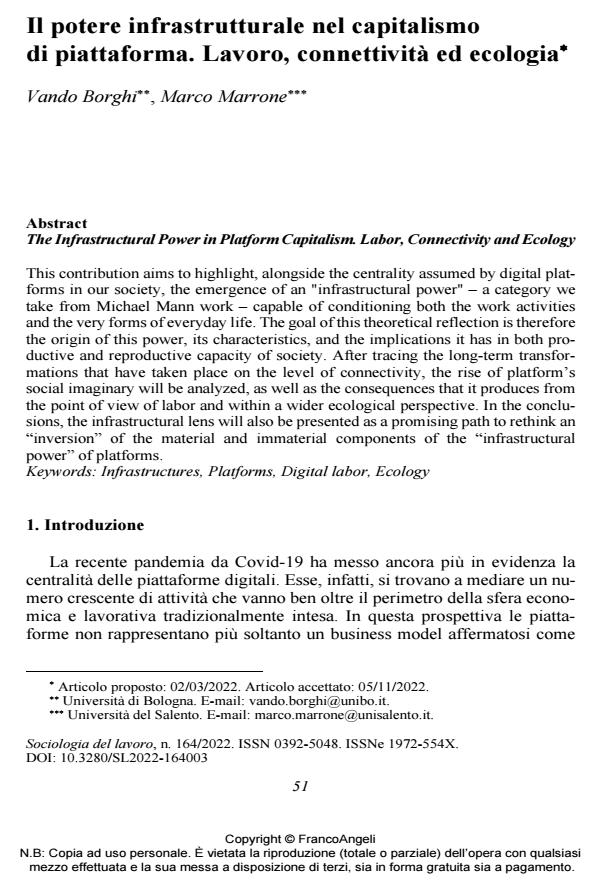The Infrastructural Power in Platform Capitalism. Labor, Connectivity and Ecology
Journal title SOCIOLOGIA DEL LAVORO
Author/s Vando Borghi, Marco Marrone
Publishing Year 2022 Issue 2022/164
Language Italian Pages 19 P. 51-69 File size 225 KB
DOI 10.3280/SL2022-164003
DOI is like a bar code for intellectual property: to have more infomation
click here
Below, you can see the article first page
If you want to buy this article in PDF format, you can do it, following the instructions to buy download credits

FrancoAngeli is member of Publishers International Linking Association, Inc (PILA), a not-for-profit association which run the CrossRef service enabling links to and from online scholarly content.
This contribution aims to highlight, alongside the centrality assumed by digital plat- forms in our society, the emergence of an "infrastructural power" - a category we take from Michael Mann work - capable of conditioning both the work activities and the very forms of everyday life. The goal of this theoretical reflection is therefore the origin of this power, its characteristics, and the implications it has in both pro- ductive and reproductive capacity of society. After tracing the long-term transfor- mations that have taken place on the level of connectivity, the rise of platform’s social imaginary will be analyzed, as well as the consequences that it produces from the point of view of labor and within a wider ecological perspective. In the conclusions, the infrastructural lens will also be presented as a promising path to rethink an "inversion" of the material and immaterial components of the "infrastructural power" of platforms.
Keywords: Infrastructures, Platforms, Digital labor, Ecology
- Da landlocked a landlinked alle proprie condizioni: connettività e megaprogetti in Turkmenistan Matteo Fumagalli, in ASIAC – Studies on Central Asia and the Caucasus (SCC) /2025 pp.21
DOI: 10.36253/asiac-3578 - Esperienza operaia dell'ecologia e ambientalismo del lavoro all'Italsider/Ilva di Taranto. Dagli anni Cinquanta al 2018 Emanuele Leonardi, in SOCIOLOGIA DEL LAVORO 165/2023 pp.155
DOI: 10.3280/SL2023-165008 - Diversity and Inclusion in Italy Attila Bruni, pp.663 (ISBN:978-3-031-81937-7)
Vando Borghi, Marco Marrone, Il potere infrastrutturale nel capitalismo di piattaforma. Lavoro, connettività ed ecologia in "SOCIOLOGIA DEL LAVORO " 164/2022, pp 51-69, DOI: 10.3280/SL2022-164003